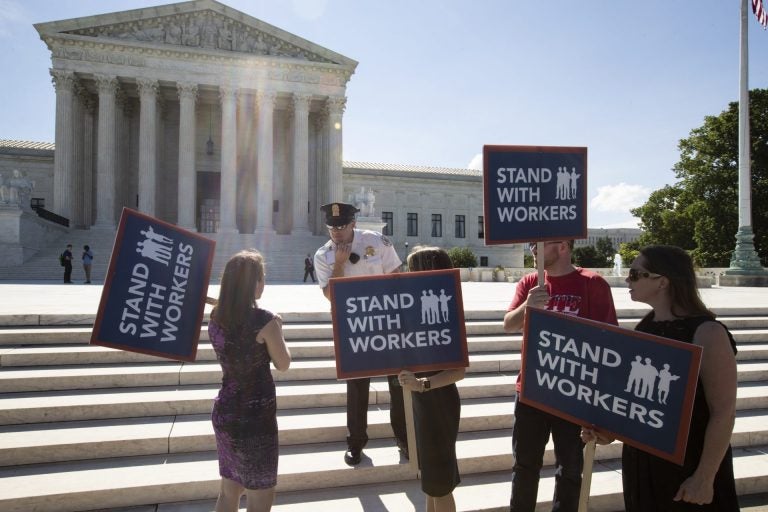Dispute arises over who gets credit for union escape clause in Pa. government labor contracts
The inclusion of the so-called “maintenance of membership” clause in the former contracts is the subject of pending lawsuits.

People gather at the Supreme Court awaiting a decision in an Illinois union dues case, Janus vs. AFSCME, in Washington, Monday, June 25, 2018. The outcome of that case and several others were not announced Monday as the court's term comes to a close. (J. Scott Applewhite/AP Photo)
This PennLive article appeared on PA Post.
An estimated 21,000 Pennsylvania state government employees can now easily drop their union membership at any time as a result of a change written into their recently ratified labor contracts.
Previously, these employees represented by the Service Employees International Union Local 668, the United Food and Commercial Workers Local 1776, and the Pennsylvania State Correctional Officers Association were forced to pay union dues and limited to resigning their union membership in the 15-day window that opened prior to their labor contract expiring.
The inclusion of the so-called “maintenance of membership” clause in the former contracts is the subject of pending lawsuits that have the backing of the Harrisburg-based Fairness Center, a nonprofit anti-union public interest law firm.
“Maintenance of membership restrictions clearly violate our clients’ constitutional rights, and union officials should have dropped those restrictions a long time ago,” said David Osborne, president and general counsel for the Fairness Center. “It’s a big step in the right direction. Our clients had to sue to enforce their rights and the rights of those who are similarly situated, and only then did their union officials start to doubt their constitutional authority to keep members from resigning.”
While not speaking for the other unions, Wendell Young IV, president of the UCFW Local 1776, called the Fairness Center’s claim about the lawsuits being a factor in the removal of this clause from his union’s new contract as absolute nonsense.

“There’s a very basic element of every contract our union has in both the public and private sector and that is if any provision is found to be inconsistent due to a change in the law or invalidated by changes in the law, they are considered invalidated. So Janus changed the law,” Young said.
He is referring to last year’s Janus ruling by the U.S. Supreme Court that stated public employees who are not union members cannot be compelled to pay union dues or fees as a condition of employment.
“The Supreme Court ruled and whether I like the ruling or not contracts have to conform to the law. That’s why we changed them,” Young said.
According to the Fairness Center, when public employees attempted to act on this court-granted right to resign from the union, union officials rejected their request, citing this “maintenance of membership” provision. The center filed seven lawsuits, including one filed in federal court by five corrections officers, since the Janus ruling on behalf of public employees seeking to leave their union.
Aligning contract language to reflect the current state of the law “is what our contracts have said for decades-long before there was this farce of an organization called the Fairness Center and that’s the nature of labor law,” Young said.
Osborne said union officials’ promises to end the “maintenance of membership” restrictions kept the center’s clients from resigning from the union. What’s more, he said state law still authorizes maintenance of membership restrictions, which he said means this provision could return in future contracts. So the lawsuits are continuing.
“Our clients are pursuing a court ruling that, among other protections, strikes down the ‘maintenance of membership’ statute as unconstitutional,” Osborne said.
WHYY is your source for fact-based, in-depth journalism and information. As a nonprofit organization, we rely on financial support from readers like you. Please give today.




